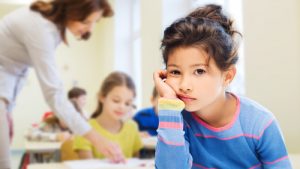Improve Well-Being and Emotion Regulation Strategies in Primary School Children with Mindfulness
By John M. de Castro, Ph.D.
“In today’s rush we all think too much, seek too much, want too much and forget about the joy of just Being.” -Eckhart Tolle-
Childhood is a miraculous period during which the child is dynamically absorbing information from every aspect of its environment. It is here that behaviors, knowledge, skills, and attitudes are developed that shape the individual. But what is absorbed depends on the environment. If it is replete with speech, the child will learn speech, if it is replete with trauma, the child will learn fear, if it is replete with academic skills the child will learn these, and if it is replete with interactions with others, the child will learn social skills. If it is replete with mindfulness, the child will learn to value the present moment.
Elementary school environments have a huge effect on development. They are also excellent times to teach children the skills to adaptively negotiate its environment. Mindfulness training in school, at all levels has been shown to have very positive effects. These include academic, cognitive, psychological, and social domains. Importantly, mindfulness training in school appears to improve the student’s self-concept. It also improves attentional ability and reduces stress, which are keys to successful learning in school. Since, what occurs in the early years of school can have such a profound, long-term effect on the child it is important to further study the impact of mindfulness training on the development of emotion regulation and thinking skills in elementary school children.
In today’s Research News article “Mindfulness in primary school children as a route to enhanced life satisfaction, positive outlook and effective emotion regulation.” (See summary below or view the full text of the study at: https://www.ncbi.nlm.nih.gov/pmc/articles/PMC7341670/) Amundsen and colleagues recruited 5th grade students aged 9 to 10 years and assigned different classrooms to either a wait-list control condition or to receive 6 weekly 1 hour sessions of either living mindfully training or well-being training. The children were measured before and after treatment and 3 months later for mindfulness, positive and negative emotions, positive outlook, positive emotional states, student life satisfaction, and emotion regulation.
They found that in comparison to baseline and the wait-list and well-being training groups the children who received living mindfully training had significant increases in mindfulness, positive outlook, and student life satisfaction at the end of training and 3 months later. They also report that the greater the changes in mindfulness produced by the program the larger the increases in positive emotional states, positive outlook, satisfaction with life, and reappraisal emotion regulation and the larger the decreases in negative emotions
A strength of the study was the use of an active control condition, well-being training. This helps eliminate a number of potential confounding effects of participant expectations, attention effects etc. This then strengthens the case that living mindfully training has positive effects on the psychological well-being of 5th grade children and may improve their ability to reappraise and thereby better regulate their emotions. It was not examined whether these benefits resulted in better academic performance.
So, improve well-being and emotion regulation strategies in primary school children with mindfulness.
“For children, mindfulness can offer relief from whatever difficulties they might be encountering in life. It also gives them the beauty of being in the present moment.” – Annaka Harris
CMCS – Center for Mindfulness and Contemplative Studies
This and other Contemplative Studies posts are also available on Google+ https://plus.google.com/106784388191201299496/posts and on Twitter @MindfulResearch
Study Summary
Amundsen, R., Riby, L. M., Hamilton, C., Hope, M., & McGann, D. (2020). Mindfulness in primary school children as a route to enhanced life satisfaction, positive outlook and effective emotion regulation. BMC psychology, 8(1), 71. https://doi.org/10.1186/s40359-020-00428-y
Abstract
Background
Mindfulness programmes as a potential avenue of enhancing pupil wellbeing are beginning to show great promise. However, research concerning the effectiveness of mindfulness training for primary aged school children (7–11 years of age) has been neglected.
Methods
Building on methodological limitations of prior research, this study employed an active controlled design to assess the longer term wellbeing and emotion regulation outcomes after a 6 week mindfulness programme (Living Mindfully Programme, UK), for a group of school children aged between 9 and 10. The programme was delivered by class teachers as part of their normal curriculum entitlement. One hundred and eight children took part from across three schools in North East of England. Participants formed a treatment group (n = 64), active control (n = 19) and wait list control (n = 25). Self-report measures of wellbeing, mindfulness and emotion regulation were collected at pre and post training as well as at 3 months follow up.
Results
Reliable findings, judged by medium to large effect sizes across both post intervention, follow-up and between both controls, demonstrated enhancement in a number of domains. Immediately after training and follow up, when compared with the wait list control, children who received mindfulness training showed significant improvements in mindfulness (d = .76 and .77), Positive Outlook (d = .55 and .64) and Life Satisfaction (d = .65 and 0.72). Even when compared to an active control, the effects remained although diminished reflecting the positive impact of the active control condition. Furthermore, a significant positive relationship was found between changes in mindfulness and changes in cognitive reappraisal.
Conclusions
Taken together, this study provides preliminary evidence that the Living Mindfully Primary Programme is feasibly delivered by school staff, enjoyed by the children and may significantly improve particular components of wellbeing. Importantly, higher levels of mindfulness as a result of training may be related to effective emotional regulatory and cognitive reappraisal strategies.
https://www.ncbi.nlm.nih.gov/pmc/articles/PMC7341670/
